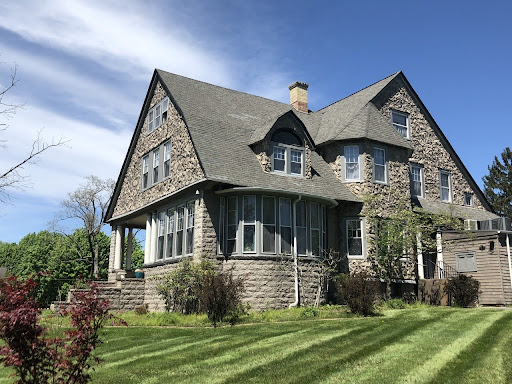Restoring Hope at The Castle On The Hill by Dr. Deanee Johnson
In a small town, quietly nestled in the Appalachian mountains, is a commanding structure reminiscent of a castle through the eyes of the children who step through the threshold. Trudy’s House in Beckley, West Virginia, offers a sanctuary to those children and their families during some of the most challenging times in their lives. Trudy’s House is the headquarters of Just for Kids, Inc. Child Advocacy Center (JFK CAC). This non-profit organization provides a neutral, child-friendly environment for the investigation of child abuse and neglect and assists with interviewing child witnesses to violent crimes. JFK also has another location serving the tightly knit community of Fayetteville, WV. JFK is where law enforcement, child protective services, and other investigative entities can work together to investigate these crimes and improve offender accountability. At the same time, CAC staff offers space for child forensic interviews and provides comfort and support through therapy, advocacy, and resources.
On November 6, 2023, I assumed the role of executive director at JFK. It was my birthday, and I couldn’t think of a better birthday gift for myself. Over the last twenty-plus years, I have dedicated my life to improving outcomes for children who have been abused. My career goal was to land an executive directorship of an agency whose clients would benefit from advancements in the field and whose board of directors and staff would be open to my “pie in the sky” vision of eradicating secondary trauma and compassion fatigue.
Some people might ask why this is so important. It’s important because every family interacting with these professionals will remember this interaction for the rest of their lives. They will remember if their experience was positive or negative. Of course, we want all families to have a positive experience. And wouldn’t it be nice if those whose experiences were less than positive had an understanding as to why? But it’s not fair to expect them to navigate the internal struggles that their investigative team members might be experiencing or excuse an apathetic caseworker, an uninterested interviewer, or a harsh detective.
Individuals who work investigating and responding to these types of crimes are exposed to the negative impact of trauma as well and are not impervious to being affected by such traumatic experiences; this is especially true for law enforcement, victim service providers, medical professionals, and mental health providers. However, we assume they have the tools necessary to address the added unprecedented emotional stress put upon them to hold offenders accountable where extensive systems and jurisdictional differences may pose an issue. That is where JFK can step in.
Many of the children and families who come to a child advocacy center are often plagued with anxiety, ambiguities, hopelessness, and fear. JFK understands these challenges and helps alleviate some of these added stressors for families, making the investigative process more victim-centered and child-friendly. However, I would be remiss as a leader in the field if I only advocated for the well-being of the children and families and not of the men and women who dedicate their lives to working these cases.
Repeated exposure to traumatic events will eventually lead to the deterioration of one’s ability to function normally and impede mental health and cognition, often leading to compassion fatigue. Compassion fatigue is the emotional or physical fatigue of caring for others without the consideration or time taken to care for oneself. It can leave an individual feeling hopeless or unable to feel compassion for others. It drains us of our motivations and depletes us of our happiness. As a result, we lose focus and often become isolated and depressed. This vicarious response is the antithesis of what these children need in a response team.
When a family comes to JFK, it is now my responsibility to ensure that the professionals they interact with do so in a compassionate and empathetic manner to restore hope rather than deplete the already lowered reserves. I have committed to the JFK staff and investigative team members to address vicarious trauma and compassion fatigue.
Taking this position has renewed my dedication to supporting staff and team members’ exposure to the realities of trauma by advocating for self-care and prioritizing mental and physical health before others. Child advocacy centers are known for being trauma-informed and accredited based on their practices. It is my desire that when investigative team members come to our sites, their eyes widen with optimism because they know we are here to provide a reprieve from chaos, give them a sense of calm during the storm, and the feeling that they have support and understanding when case outcomes don’t always go in the direction that we’d hope they would.
We are responsible for ensuring that our trauma response agencies and leadership lead by example by caring for their staff, being trauma-informed, and caring for themselves. The adage is true: one can not help others if one cannot help oneself first. Think of it as the mental health oxygen mask. The children and families we serve deserve to be treated with dignity and respect. They need supportive people in their corner shining light in a very dark space. They need their investigative team to be not only physically present but emotionally present, reassuring them that one day they will overcome their trauma and can look back at the castle on the hill as a beacon of hope. ❦

About the Author
Deanee’ Johnson, Ph.D., began her career in victim services as a mentor for adolescent sexual assault survivors. She has over 20 years of experience in the crime victim field, working directly and indirectly with victims meeting the needs of children and their families.
Dr. Johnson is the Executive Director at Just for Kids, Inc., a child advocacy center that serves Raleigh and Fayette counties in West Virginia. Before becoming the executive director at Just for Kids, Inc., she established ACCS Online, a consulting company assisting agencies in responding to child adversities and trauma. She is a trained child forensic interviewer and assisted in establishing the first forensic interview program for Patsy’s House Children’s Advocacy Center in Wichita Falls, Texas.
Dr. Johnson completed a three-year fellowship with the U.S. Department of Justice Office for Victims of Crime, where she created the Child Exploitation and Polyvictimization Working Group, which worked in conjunction with the U.S. Office of the Deputy Attorney General to identify the range of child sexual exploitation programs available nationwide, illuminating best practices. She has assisted Facebook’s Safety Advisory Board to establish policies protecting children and youth on their social media platform. She is Chair Emeritus of the nonprofit Preparedness Without Paranoia’s advisory board.
Dr. Johnson has a B.A. in criminal justice from Sam Houston State University, an M.A. from Midwestern State University in counseling, and a Ph.D. in child development from Texas Woman’s University.
